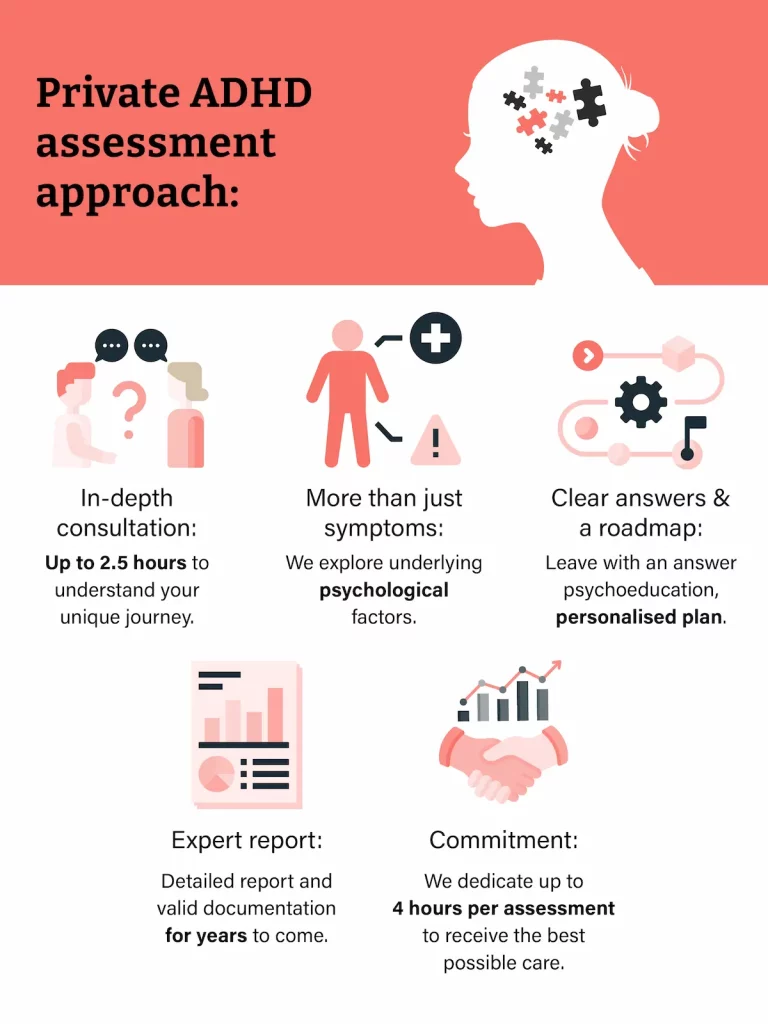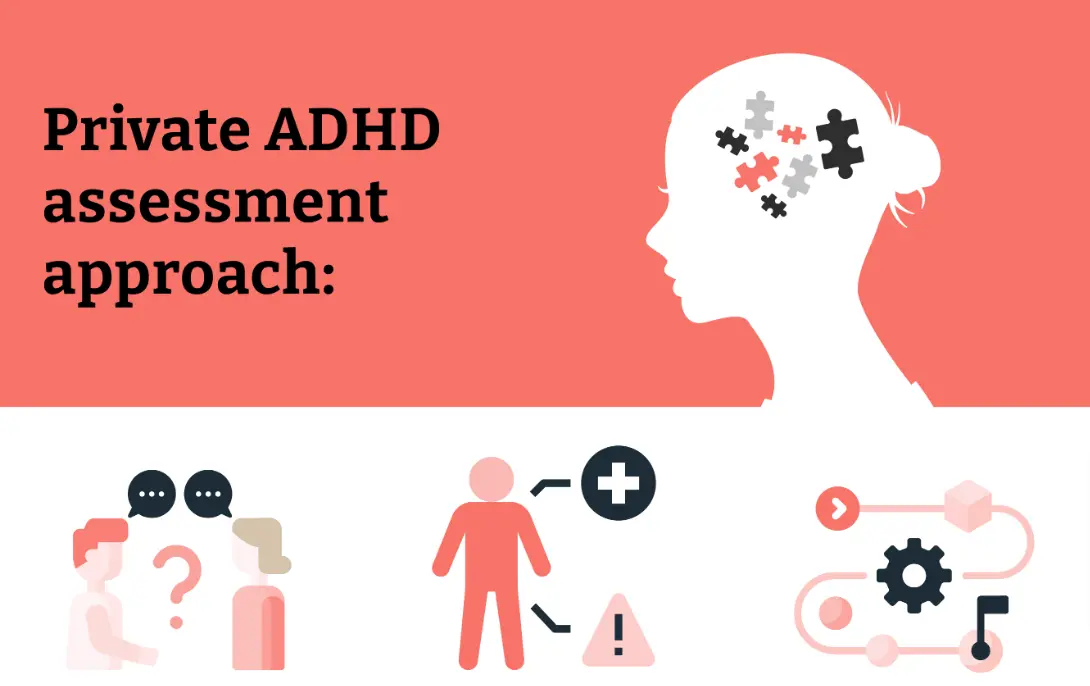Are you constantly struggling to stay focused and on task? Do you feel restless, impulsive, and like your brain is running on overdrive? If so, you might have Attention Deficit Hyperactivity Disorder (ADHD).
ADHD is a neurodevelopmental disorder that affects millions of children and adults worldwide. Without an accurate diagnosis, individuals with ADHD often face significant challenges in school, work, and personal relationships. However, with the right support and treatment, they can unlock their full potential and lead fulfilling lives.
Imagine concentrating better, managing your impulses, and staying organised effortlessly. An accurate ADHD diagnosis is the first step toward achieving this goal. By understanding your unique strengths and challenges, you can access the resources and tools you need to thrive.
In this comprehensive guide, we’ll take you through the entire process of getting an accurate ADHD diagnosis, from finding the right professionals to preparing for your evaluation.
The Importance of an Accurate Diagnosis
Let’s start by understanding why an accurate ADHD diagnosis is so important. ADHD is a neurodevelopmental disorder that affects both children and adults.
Without a proper diagnosis, you might struggle unnecessarily or receive inappropriate treatment.
An accurate diagnosis is the key to accessing the right resources, accommodations, and treatments that can dramatically improve your quality of life.
According to the National Institute of Health and Care Excellence, approximately 3-4% of adults in the United Kingdom have ADHD.
However, many cases remain undiagnosed, especially in adults. Getting an accurate ADHD diagnosis can be a game-changer, allowing you to better manage your symptoms and unlock your full potential.
The Evaluation Process
To get an accurate ADHD diagnosis, you’ll need to undergo a comprehensive evaluation process.
This typically involves several steps, including:
- Initial Screening: Your healthcare provider or a mental health professional will ask you questions about your symptoms, medical history, and daily challenges. They may also request input from your family members or teachers (for children).
- Psychological Testing: You’ll complete a series of standardized tests designed to assess your attention, concentration, impulsivity, and executive functioning skills. These tests help identify patterns consistent with ADHD.
- Collateral Information: Your evaluator may gather information from other sources, such as your school records, workplace evaluations, or reports from loved ones. This helps provide a well-rounded understanding of your symptoms across different settings.
- Ruling Out Other Conditions: Since ADHD shares symptoms with other disorders, your evaluator will work to rule out alternative explanations for your challenges, such as anxiety, depression, or learning disabilities.
It’s important to note that there’s no single test for ADHD. The diagnosis is based on a comprehensive evaluation of your symptoms, history, and functional impairments.

Choosing the Right Professional in the UK
Not all healthcare professionals are equally equipped to evaluate and diagnose ADHD, especially in adults. When seeking a private ADHD assessment UK, it’s crucial to work with a professional who has specialised training and experience in this area.
Consider the following options:
- Clinical Psychologists or Neuropsychologists: These professionals assess cognitive, emotional, and behavioural functioning. They can conduct comprehensive ADHD evaluations using standardised tests and clinical interviews.
- Psychiatrists or Psychiatric Nurse Practitioners: These mental health professionals can diagnose ADHD and provide medication management if needed. They may also collaborate with psychologists for thorough evaluations.
- Developmental-Behavioral Pediatricians: For children and adolescents, these specialists have expertise in evaluating and treating neurodevelopmental disorders, including ADHD.
If you’re seeking a private ADHD diagnosis in London or elsewhere in the UK, look for professionals who specialise in private ADHD assessments. These providers often have more flexibility and can offer comprehensive evaluations tailored to your needs.
Preparing for Your Evaluation
To ensure a smooth and accurate evaluation process, take the time to prepare. Here are some tips:
- Keep a Symptom Journal: Document your experiences, challenges, and any situations where your ADHD symptoms seem most pronounced. This information can provide valuable insights for your evaluator.
- Gather Previous Records: Collect any relevant medical records, school reports, or workplace evaluations that could shed light on your symptoms and their impact over time.
- Involve Others: Ask family members, teachers, or colleagues who have observed your behaviours to provide their perspectives. Their input can help paint a more complete picture of your challenges.
- Be Honest and Open: Approach the evaluation process with honesty and openness. Provide detailed and accurate information about your symptoms, challenges, and any previous treatments or interventions.
Managing Expectations
The process of an ADHD diagnosis can be both exciting and daunting. It’s crucial to have realistic expectations about the process to avoid frustration or disappointment.
One key thing to remember is that a comprehensive evaluation takes time – it’s not a quick visit to the doctor’s office.
Be prepared to invest several hours or even multiple sessions with the evaluator as they conduct various tests and interviews to gather a complete picture of your symptoms and challenges. Patience is key during this thorough process.
Another important expectation to manage is the possibility of ruling out other conditions before reaching an ADHD diagnosis.
Your evaluator needs to eliminate alternative explanations for your struggles, such as anxiety, depression, or learning disabilities.
While this step might seem frustrating, it’s necessary to ensure an accurate assessment. If you do receive an ADHD diagnosis, don’t view it as a limiting label – it’s simply the starting point for understanding your unique strengths and needs.
Additionally, even after diagnosis, ongoing support from professionals, therapists, or support groups may be required to effectively manage your symptoms long-term.
Final Thoughts
Getting an accurate ADHD diagnosis can be a process, but it’s a worthwhile one. By understanding your unique strengths and challenges, you can take steps to manage your symptoms, improve your quality of life, and reach your full potential.
During the process, stay patient, and remember that an accurate diagnosis is the first step toward a more fulfilling and productive life.
